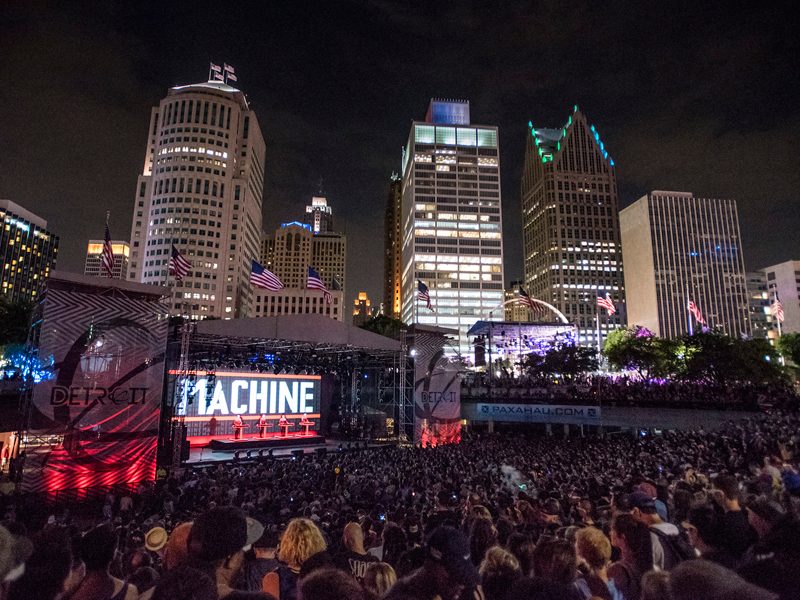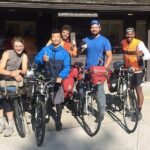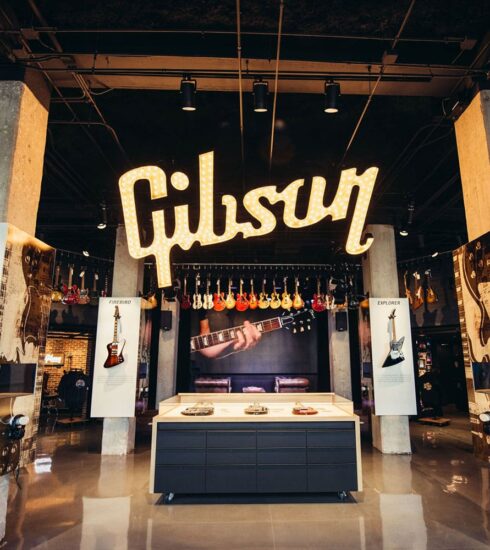The Spirit of Detroit is Alive & Well at Movement Detroit
photo by Bryan Mitchell
Detroit might be a city plagued with hardship but it is currently on the rebound. Nothing says celebration more than summertime, and for a city drowning in artistic talent one festival continues to represent its heart…we’re talking about Movement Detroit.
Coined the Motown Capital of the world, Detroit has a history of producing some of the most memorable and iconic artists, but more recently, electronic music has proudly made its way onto that list. With Richie Hawtin and Carl Cox headlining Movement, the city could not feel more alive!
Centered in the middle of downtown, the venue was stunning. Detroit’s skyline acted as the backdrop for the festival as each stage perfectly aligned in front of the urban skyscrapers. It was a concrete jungle like never before. T
Detroit Techno took to the main stage where the air was hot and heavy as attendees pulsed throughout day and into the night. With six stages it was easy to hear your favorite local or national artists. The bass was so loud that it wouldn’t be surprising if even the Canadians could hear the kick drum.
Shirts were damn and blowing up from the subwoofer pushing wind into the crowd. It was a site to see, with visuals only created by light and fog machines. Movement Detroit was clearly all about reconnecting fans with a city they had grown to love.
MiLLENNiAL was lucky enough to catch up with two local Detroit artists who played Movement, John Johr and Twin Cousin, to get their take on music in Detroit.
What would you say is your signature sound or style and what sets you apart from others?
John Johr: I don’t have a signature sound or style. I pick tracks that I love and I mesh them together in a manner that makes sense to me and then hopefully it translates to the audience. It’s never been about a style or genre. It’s all about what connects with me, and then trying to present that connection with the fans.
Twin Cousin: Our sound is dependent on our environment and what type of mood we are in. We go anywhere from house to techno to really hard stuff. Whatever we are feeling that day. It’s always edgy stuff that makes you want to move, makes you feel something deep inside your stomach that’s forcing you. It’s like a hard ghetto bouncy techno that we never plan. We just flip through some ideas and if we feel something we go on it. It’s more of a journey without any destination in site when we’re writing music or even DJing. So, you never know what you’re going to get and that’s the best part of it: the unknown.
Who or what has influenced you? Any specific artists or sounds you felt connected to?
John Johr: It’s been an interesting path for me. I started out as a hip-hop kid and grew up listening to Wu Tang Clan. I was a skateboarder for a long time so I had a good run with punk rock. On the radio you had Gary Chandler, Don Que, these hip hop DJs that would play ghetto tech and booty drop.
Godfather and dudes like that would kick you in the teeth! I would always listen and think this was sweet – they were cutting and scratching… there was the four on the floor fast dance music aspect but it was ghetto. Then I went to a rave party in 1999 and it was a similar style but it was slow, and I fell in love instantly with house music. There was this linage or progression that makes no sense at all; no parallels but that’s kind of how my sets are. Those are my upbringings – hip-hop, punk rock, ghetto tech, and house music. Now I pretty much play house, techno, dub house, and various sub genres. If it sounds good and if it works for me at the time I play it. I like everything. There are no boundaries. If it speaks to me I’ll sample it.
Twin Cousins: As far as our sound, I was listening to a bunch of metal. I played the guitar when I was growing up. I was in a band but I got into producing because I got tired of working with band members. I just started making drum tracks to overlay with baselines. That eventually evolved into electronic music, techno, and house.
What opened my eyes to what we have in the city were the late night ghetto tech sets that you can catch on the radio. I used to stay up when I was 13 on Sunday nights and my parents would tell me it’s time for bed. But I would run an extension headphone cable from my radio to my bed so I could listen to tunes at night.
The first show I went to was Robin Trawer. I was the youngest kid there. I got into hardcore metal when I was part of a band. They kicked the drummer out and then I chose to leave at the same time. But the drummer’s brother told me to check out Movement Detroit and that’s when I connected with this sound. I knew that this is exactly what I need to do.
Which do you prefer? Live shows or producing?
John Johr: That’s easy… live shows all day. I feed off the energy that a crowd brings. I feel like if there aren’t people in the room, then I’m not going to play well. If there are people in the room, then I know that I’m going to connect with them on a higher level. That connection is what drives me to be who I am, what I am. Straight-forward cut and dry.
Twin Cousin: It’s an unmatched energy playing live. There are a bunch of DJ’s that pre record their sets. There is just something about seeing and making live music that excites me. When that record button is on I get a different feeling, an energy that is unmatched. We have some gear that we want to introduce into our sets to make it more live. It’s a little nerve wrecking but it’s worth it. It’s tough and the people that can do it live are extremely talented, especially when it’s a single dude doing the whole show. When you have live instruments it’s harder to change what you are doing based on the crowed. You’re committed to those songs and reacting to the crowd is not as easy.
What’s your mantra as you proceed in your career? What are you telling yourself every day to get yourself through anything?
John Johr: My current mantra is full circle. I’ve gone full circle from where I started to where I went and where I’ve ended up. Pretty interesting story. The predication behind that is fun. I’m always going to be looking for the opportunity to have a good time. I don’t think any of this is possible without the proper energy. That’s it. Have fun. If you’re not having fun you’re doing the wrong thing. I always told myself that if I wasn’t haven’t fun it was time to quit. There was actually a time when that was true. I stopped having fun and I quit. I stuck to my own advice then I got really miserable.
Twin Cousin: Not to force anything because when you’re trying to make something forced it’s not a natural motion. There is no flow. I never looked at music as a job, it’s just something that I’ve always wanted to do. No matter what I was never going to look at it like a job. There is that struggle between the starving artist and making it something you can live on. Your heart needs to be in it because then you’re doing things that you wouldn’t normally do. We still work 40 hours a week but it’s on our time. The most important part of all this is using your time effectively. Do your research and you apply what you learn.
To learn more about Movement Detroit or find out when the festival is taking place next year, be sure to follow the Movement via Facebook, Instagram and Twitter.









